MercoPress. South Atlantic News Agency
Tag: argentina economy
-
Wednesday, August 21st 2019 - 08:52 UTC
Argentina’s Economic Crisis: Who to blame?
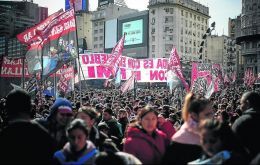
Argentines remember the role the IMF played in the last depression. They also remember the improvement in their lives under Kirchnerism. The following was published by The New York Times.
-
Wednesday, July 17th 2019 - 22:19 UTC
Argentina's inflation expected to stay on the downpath in July
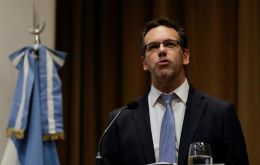
Argentine Central Bank President Guido Sandleris Tuesday admitted inflation remains “high,” but he forecast July's figures will be smaller than those of June in light of the current “clear trend” to the downside.
-
Friday, July 12th 2019 - 10:26 UTC
The IMF will release another $ 5.4 billion today for Argentina
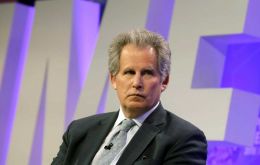
Mauricio Macri’s Government must guarantee that with the new disbursement in favor of Argentina for USD 5.4 billion that the International Monetary Fund (IMF) will sign this Friday will comply with all the deadlines agreed for this year. This new disbursement is given after the approval of the quarterly goals to March by the technical staff of the fund.
-
Tuesday, July 9th 2019 - 09:55 UTC
President Macri's reelection chances improving according to leading pollster

President Mauricio Macri’s chances of winning Argentina’s election this year are improving as public sentiment climbs and the economy begins to find its footing after a currency crisis, according to Alejandro Catterberg, director of Poliarquia, one of the nation’s top pollsters.
-
Tuesday, July 2nd 2019 - 09:49 UTC
ITUC: “IMF program in Argentina has failed to deliver on its promises”
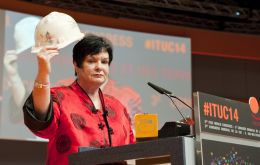
One year since its start, it has become clear that the IMF program in Argentina has failed to deliver on its promises to fix the economy while protecting the most vulnerable. Despite the worsening economy, large human costs, and a significant downward adjustment of growth projections, the IMF is doubling down on its austerity approach and requiring additional spending cuts to meet budget targets.
-
Thursday, June 20th 2019 - 09:46 UTC
Unemployment in Argentina jumps to 10.1% in the first quarter of 2019
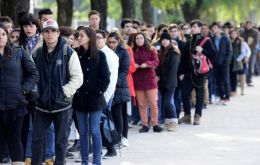
Argentina's unemployment rate rose to 10.1% in the first quarter from 9.1% in the first three months of last year, the official INDEC statistics agency said. This is the highest level since current president Mauricio Macri took office, and the worst in thirteen years.
-
Thursday, June 20th 2019 - 09:44 UTC
Argentina's economy contracted 5,8% during the first quarter of 2019

Argentina’s economy contracted 5.8% in the first quarter of 2019, the country’s statistics agency said on Wednesday, a reflection of the biting recession that has hammered domestic consumption and production.
-
Wednesday, June 19th 2019 - 09:57 UTC
Latam stocks and currencies surged on Tuesday on favorable global news

Latin American stocks and currencies surged on Tuesday with a dovish boost from the European Central Bank and positive headlines from the U.S.-China trade tensions boosting sentiment.
-
Thursday, June 6th 2019 - 09:59 UTC
Lagarde admits underestimating the Argentine economic situation

The International Monetary Fund, IMF, admitted on Wednesday that it had underestimated the “incredibly complicated situation” of the Argentine economy and also that taming inflation had taken much longer than originally expected.
-
Wednesday, June 5th 2019 - 21:00 UTC
Uruguay: Finances don't grow; Economy Minister estimates an improvement for the second semester, as Macri did

Uruguay is experiencing, in recent months, a marked drop in investment and the generation of employment. Uruguayan Economy Minister Danilo Astori admitted Wednesday the fall of public accounts, with an annualized fiscal deficit in April that was 4.8% of GDP, and opted to provide greater incentives to investors and entrepreneurs. The Uruguayan press accuses the government of betting on the hope that the results will begin to be felt in the second half of the year, as it was heard a while ago in Argentina under the administration of President Mauricio Macri.
